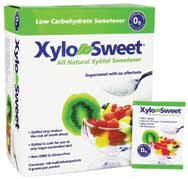Xylitol – It’s not just another “all Natural” product
Let’s get to the point of this quickly – xylitol is a natural sweetener that has numerous proven health benefits. As a dentist, I am always evaluating products, supported by research, that will help my patients. We live in a day and age where we are constantly being bombarded with the latest and greatest “allnatural” product that claims to be able to help improve our health, only later to find out it doesn’t do any of the things claimed. So why is this different? Let me explain what xylitol is and how it works.
Xylitol Defined
Xylitol is a naturally occurring sweetener found in a variety of fruits (berries), vegetables (cauliflower, mushrooms, corncobs), and trees (birch wood). It is a fivecarbon sugar polyol (alcohol), with approximately 40 percent fewer calories than table sugar.
The human body naturally produces xylitol by metabolizing carbohydrates in the stomach.
 Xylitol was discovered in Germany in 1890; although only recently did it receive attention when studies were conducted in Turku, Finland in 1970 to evaluate the effectiveness of xylitol on the reduction of dental plaque. Since then there have been numerous studies to support the health benefits of Xylitol. Xylitol is approved by the FDA and World Health Organization.
Xylitol was discovered in Germany in 1890; although only recently did it receive attention when studies were conducted in Turku, Finland in 1970 to evaluate the effectiveness of xylitol on the reduction of dental plaque. Since then there have been numerous studies to support the health benefits of Xylitol. Xylitol is approved by the FDA and World Health Organization.
How does it work?
Xylitol is different than fructose and glucose which are six carbon monosaccharide units and different from sucrose which is composed of glucose and fructose units. Sucrose, glucose, and fructose are food sources for the bacteria Streptococcus mutans (S. mutans). The bacteria ingest these sugars and their excretions produce plaque which then may lead to cavities. Because xylitol is a five carbon structure, rather than provide nutrients to S. mutans, xylitol actually blocks the bacteria’s harmful effects and interferes with the bacteria’s metabolism not allowing it to produce plaque.
The numbers of S. mutans in the oral cavity are significantly reduced, which decreases acid production and raises pH levels, which is great for the teeth and oral cavity.
Oral Health Benefits of Xylitol
- Promotes tooth remineralization
- Decreases dental caries
- Reduces numbers of cavity causing bacteria
- Lowers plaque levels
- Reduces dry mouth
- Enables more neutral oral pH
- Improves bad breath
How should you use xylitol?
Research shows that 6g to 10g a day is enough. Xylitol should be chewed immediately after a meal or a snack , and it is recommended to have approximately five servings of xylitol throughout the day. There are many products that contain xylitol, including chewing gum, hard candies, mints, lozenges, nasal sprays, toothpastes, mouthrinses, energy bars and as a sweetner. But not all xylitol containing products are created equally. Be careful to select a xylitol containing product that has xylitol as the only sweetener in the product. Many companies are jumping on the xylitol bandwagon and adding a trivial amount of xylitol to their sugar or other sweetener containing products. There are a few potential side effects of excessive xylitol use including: bloating and intestinal distress, laxative effects, and the possibility of overdose.
In conclusion, xylitol is an all-natural, health promoting ingredient used extensively in many countries with great success. It has been proven to deliver significant dental and overall health benefits with proper dosage levels, delivery vehicles and frequency in people of all ages.
Dr. Cheryl Malick and the Dental Excellence team are
pleased to be serving the Naples area and look forward
to personally welcoming you today. We are proud to
be celebrating our 11 year anniversary. Look for Dental
Excellence, 7955 Airport Rd. N Suite 201, in the Fountain
Park Office Centre near the corner of Airport Road North
and Vanderbilt Beach Road.
Call us today to schedule your
complimentary consultation at 239.596.3434 239.596.3434.
239.596.3434.


Leave a Reply
Want to join the discussion?Feel free to contribute!